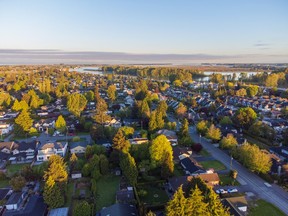The federal government’s Housing Accelerator Fund showed promise, but seven cities in Metro Vancouver have had their applications denied.

Article content
Canada needs more homes.
That point is now painfully obvious and, thankfully, supported by all major political parties. Supply is the answer, and lots of it. In fact, according to expert studies, Canada must build 3.5 million additional homes by the year 2030. Unsurprisingly, we are nowhere close to hitting this target.
Article content
While a plethora of other policies aimed at addressing the housing crisis have failed over the last decade, the federal government’s housing accelerator fund initially showed promise. Unlike previous ideas that attempted to suppress demand for new home ownership, the fund aims to incentivize local governments to do more to approve desperately needed new homes.
Advertisement 2
Article content
It’s a fair exchange — if cities can do their part to reduce red tape and speed up the construction of new housing, the federal government will be there with funding for the critical infrastructure needed to accommodate Canada’s growing population.
In Delta, our council has already taken considerable steps that have placed us at the forefront of cities in our region in terms of expedited approvals. We have recently embarked on a housing-forward update to our official community plan with a timeline that would likely see Delta be among the first municipalities to satisfy the province’s new housing requirements.
That’s all good news.
However, a growing number of cities across the country are being told that their accelerator fund applications have been denied by the federal government, including my own city of just over 100,000 people in Metro Vancouver.
This is disappointing. Delta’s application for funding included tangible actions that were strongly aligned with actions the federal government has suggested cities need to take, including updating plans and bylaws to allow for additional density, removing regulatory restrictions and streamlining processes, pre-zoning lands, permitting accessory dwelling units, reducing parking requirements, and creating incentives for affordable housing.
Article content
Advertisement 3
Article content
Our application also outlined that Delta had been given a housing target order by the province and has adopted a concrete action plan to achieve that target.
And we’re not alone. In Metro Vancouver, at least six other cities have had their applications denied this month, including the Township of Langley, Maple Ridge, Port Coquitlam, Langley City, and White Rock.
Without money from the accelerator fund, we’ll solve one crisis only to create another, much more costly one. Absent new funding streams, our increasing population will lead to an infrastructure deficit that will stretch the ability of Canadian cities to provide critical services such as water and sewer systems, safe roads, public transit, and parks and recreation services.
The reality is municipalities are severely limited by legislation in terms of their ability to raise revenue. Years of downloading from other levels of government means cities are being asked to do more with less — an impossible task. Without senior government support, substantial property tax increases will be looked to as one of the last remaining alternatives for desperately needed local infrastructure.
Advertisement 4
Article content
Simply put, the federal government must better align their policy objectives with funding power. Cities like mine are not gatekeepers. We are allies, willing to work cooperatively to unlock the potential of Canada’s housing growth opportunity.
Municipalities across Canada will now be paying close attention to the upcoming federal budget to judge whether support will be renewed for the infrastructure needs of our growing cities.
For Canada’s housing objectives to succeed, it is imperative that budget 2024 deliver more money for the housing accelerator fund to support cities like Delta and those across our growing region.
Dylan Kruger is a Delta councillor, first elected in 2018.
Article content



